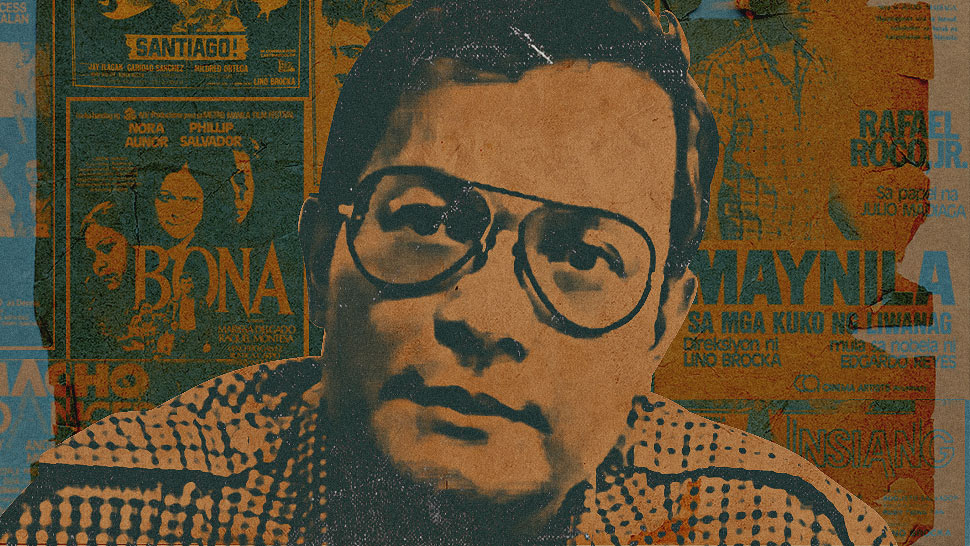By Justin Umali, Esquire Philippines, 15 April 2021
Lino Brocka, the maestro of Philippine cinema, championed justice and freedom.
There is little doubt that Lino Brocka is one of the greatest, if not the greatest, Filipino director of his age, or any age. To this day, his films Bayan Ko: Kapit sa Patalim, Ora Pro Nobis, Maynila sa mga Kuko ng Liwanag, and others enjoy critical acclaim, both for their artistic quality and social commentary.
A Young Man Who Struggled in Poverty
But Brocka as we know him now wasn’t born overnight. Before he became Lino Brocka, the activist-filmmaker, he was Catalino Ortiz Brocka, a young man who struggled in poverty like millions of his fellow Filipinos.
Brocka was born in Pilar, Sorsogon on April 3, 1939, to very interesting times. In Europe, tensions between Nazi Germany and her neighbors are at an all-time high. The Japanese are making inroads in their invasion of China as Chiang Kai-Shek and Mao Zedong struggle to cooperate in building a united resistance. In the Philippines, groups like the Ganap Party are calling for cooperation with the Japanese while the Communists were calling for a boycott of Japanese products.
There is little doubt that Lino Brocka is one of the greatest, if not the greatest, Filipino director of his age, or any age. To this day, his films Bayan Ko: Kapit sa Patalim, Ora Pro Nobis, Maynila sa mga Kuko ng Liwanag, and others enjoy critical acclaim, both for their artistic quality and social commentary.
A Young Man Who Struggled in Poverty
But Brocka as we know him now wasn’t born overnight. Before he became Lino Brocka, the activist-filmmaker, he was Catalino Ortiz Brocka, a young man who struggled in poverty like millions of his fellow Filipinos.
Brocka’s home life wasn’t any less turbulent. Raised in poverty and having lost his father at a young age, he had to work to sustain himself. As a child, he worked as a houseboy for an abusive aunt before running away to live with his mother and brother in San Jose, Nueva Ecija.
He finished high school in 1956 with honors. This allowed him to enter the University of the Philippines as a scholar—at least for a year, before losing his scholarship and ending up as a working student once more.
A Worker in Manila in a Time of Uncertainty
Maybe it was fate or circumstance, but Lino Brocka found himself at the perfect place at the right time. He was a young man working at the heart of Manila—in that strange lull between the end of the Second World War and the turbulence of the 1960s.
It was a time of post-war anxiety and uncertainty. For young workers like Lino Brocka, it meant having to work back-breaking hours for little pay, while capitalists and business owners reaped the benefits of U.S.-sponsored trade deals. Brocka drifted between odd jobs before finding himself caught in the cultural zeitgeist. At one point, he found himself in Hawaii.
But throughout it all, Brocka absorbed the changes in the weather. He was there when the student movement found its energy through Kabataang Makabayan. He was there when the labor unions went on strike. He saw the decades of poverty and exploitation that had been his life come to a boil and explode in the streets of Metro Manila.
A Director Who Mirrored Social Reality
It was then, in 1969, when Lino Brocka first got his stint as a director in the Philippine Educational Theater Association. In 1970, he directed his first film, Wanted: Perfect Mother. He would direct eight more commercial films before finding his true calling in Tinimbang Ka Ngunit Kulang.
Tinimbang Ka was the first of his many masterpieces, which included Insiang, Maynila sa mga Kuko ng Liwanag, Jaguar, and Bayan Ko: Kapit sa Patalim. As a filmmaker, he created character-driven stories that didn’t shy away from Philippine social reality. His works drifted from the tired commercial formula and drew inspiration from the things he knew: the poverty of his fellow man, the inequality of Filipino society, and the need to change it.
Lino Brocka is and will always be one of the greatest filmmakers in Philippine cinema, because his work elevated Philippine cinema as an art form. Alongside contemporaries like Ishmael Bernal and Mike de Leon, Brocka trained his camera lens inward, toward daily Filipino life, as a method of exploration and a means to critique. His works, more than being aesthetically supreme, were socially aware.
An Artist Who Took Part in the Formation of a Just Society
His decision to stand with his principles sometimes cost him. Although critically acclaimed, winning FAMAS awards and even the distinction of being the first Filipino filmmaker to be invited to Cannes, Brocka also found himself in constant dire financial straits. At one point, the Marcos dictatorship offered to pay him to make films they approved of; Brocka didn’t hesitate to say no.
That was Lino Brocka. He found himself in the company of, and was himself, an artist for the people. He understood that the mission of the artist was “to take part in the formation of a society where freedom and justice reign, a society where the rights of every human being are respected.”
He eschewed traditional ideas of filmmaking to create a more informed cinema—a legacy that echoes to this day. His ideals were largely shaped by his life: years of hard work and perseverance created Lino Brocka the filmmaker, but decades of exploitation and an unjust system headed by a fascist dictator molded Lino Brocka, the artist.
In the 1980s, Brocka found himself more and more involved in politics as an activist. He rallied his fellow artists and founded Concerned Artists of the Philippines, a mass organization of artists, filmmakers, musicians, and other masters of their craft who shared his views. He found himself with the very masses he showed in his films, and the very masses he was once a part of; this time not to train his lens on, but to stand in solidarity with. He was a fixture in picket lines, rallies, and other mass actions. Once, he was arrested during a transport strike.
His films reflected his newfound activism. Bayan Ko was released in 1984 and was deemed subversive by the Marcos regime. Abroad, it was nominated for the Palme d’Or at Cannes and was an entry for Best Foreign Language Film at the 58th Academy Awards.
By the end of the Marcos dictatorship and the People Power Uprising, Lino Brocka found himself as a veritable force of change. He was invited by the Cory Aquino administration to draft what would become the 1987 Constitution as a member of its Constitutional Commission.
The Force of Change Who Championed Freedom
It was something he would walk out from in short order, quickly sensing that the Commission was heading toward creating another repressive constitution. He left without signing the Constitution, but not before contributing his part: Article III, Section 4 of the Constitution, which states that “no law shall be passed abridging the freedom of speech, of expression, or of the press, or of the people peaceably to assemble and petition the government for redress of grievances.”
Brocka soldiered on with his principles. As the years went on and the Cory Aquino administration proved itself to be less than savory, Brocka found himself souring on the idea of Cory as President. In 1989, he released Ora Pro Nobis, a sharp critique of the Cory administration’s spotty human rights violations and the rise of state-sponsored vigilante groups across the countryside.
One of the last things Brocka campaigned for was the removal of U.S. bases in the Philippines. He would continue to do so, urging senators and the government to remove U.S. military presence in the country, until his death on May 22, 1991—barely a month after his 52nd birthday.
Brocka sadly would not live to see the removal of U.S. bases in the country. One can only wonder if he was alive today: Would he still be a fixture in protests? What kind of films would he create?
One thing is sure; Lino Brocka inspired an entire generation of artists to eschew commercial traditions and to treat their craft as a mirror of society. Lino Brocka was more than a filmmaker. He was, and still is, an integral part of our nation’s history and democracy.




